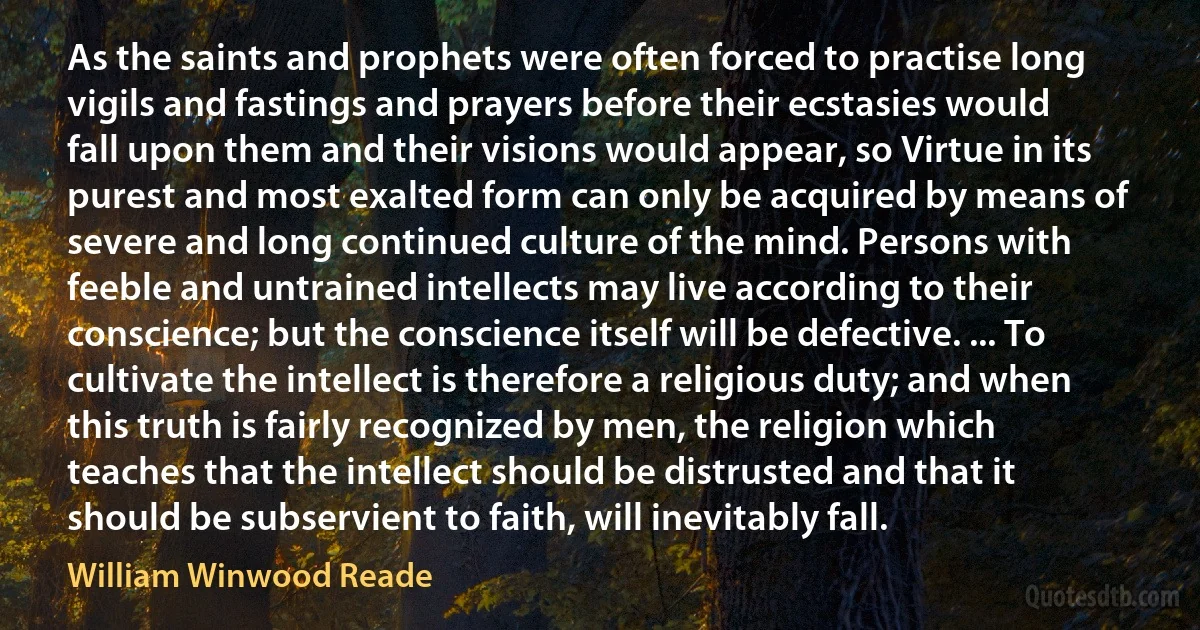
As the saints and prophets were often forced to practise long vigils and fastings and prayers before their ecstasies would fall upon them and their visions would appear, so Virtue in its purest and most exalted form can only be acquired by means of severe and long continued culture of the mind. Persons with feeble and untrained intellects may live according to their conscience; but the conscience itself will be defective. ... To cultivate the intellect is therefore a religious duty; and when this truth is fairly recognized by men, the religion which teaches that the intellect should be distrusted and that it should be subservient to faith, will inevitably fall.
William Winwood ReadeRelated topics
appear conscience defective duty faith fall form men live mind religion should truth virtue means SaintsRelated quotes
We are the beneficiaries of a life of surpassing service. Wise in wisdom and gentle in gentleness, freedom has many sides and angles. Human slavery has been swept away. With security of personal rights has come security of property rights. The freedom of the human mind is recognized in the right to free speech and free press. The public schools have made education possible for all and ignorance a disgrace. In political affairs, the vote of the humblest has long counted for as much as the vote of the most exalted. We are working towards the day when, in our industrial life, equal honor shall fall to equal endeavor.

Calvin Coolidge
Habit... makes the endurance of evil easy (which, under the name of patience, is falsely honored as a virtue), because sensations of the same type, when continued without alteration for a long time, draw our attention away from the senses so that we are scarcely conscious of them at all. On the other hand, habit also makes the consciousness and the remembrance of good that has been received more difficult, which then gradually leads to ingratitude (a real vice). [...] Acquired habit deprives good actions of their moral value because it undermines mental freedom and, moreover, it leads to thoughtless repetitions of the same acts (monotony), and thus becomes ridiculous.

Immanuel Kant
Henry of Essex's religion was the Inner Light or Moral Conscience of his own soul; such as is vouchsafed still to all souls of men;-which Inner Light shone here 'through such intellectual and other media' as there were; producing 'Phantasms,' Kircherean Visual-Spectra, according to circumstances! It is so with all men. The clearer my Inner Light may shine, through the less turbid media; the fewer Phantasms it may produce,-the gladder surely shall I be, and not the sorrier! Hast thou reflected, O serious reader, Advanced- Liberal or other, that the one end, essence, use of all religion past, present and to come, was this only: To keep that same Moral Conscience or Inner Light of ours alive and shining.

Thomas Carlyle
The formulation "ways to faith" could be interpreted as implying that faith is a conclusion a person may come to after pondering certain facts about the world-facts about history, nature, or consciousness. If that were the case, one could lead a person to this conclusion by presenting these facts to him and pointing out their implications. I, however, do not regard religious faith as a conclusion. It is rather an evaluative decision that one makes, and, like all evaluations, it does not result from any information one has acquired, but is a commitment to which one binds himself. In other words, faith is not a form of cognition; it is a conative element of consciousness.

Yeshayahu Leibowitz
You are no doubt aware that the Almighty, desiring to lead us to perfection and to improve our state of society, has revealed to us laws which are to regulate our actions. These laws, however, presuppose an advanced state of intellectual culture. We must first form a conception of the Existence of the Creator according to our capabilities; that is, we must have a knowledge of Metaphysics. But this discipline can only be approached after the study of Physics: for the science of Physics borders on Metaphysics, and must even precede it in the course of our studies, as is clear to all who are familiar with these questions.

Maimonides
